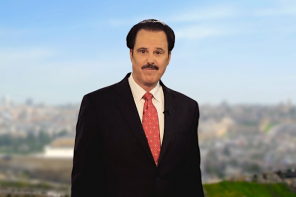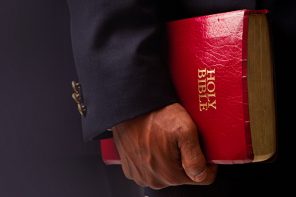There’s a lot of chatter about a video, made in 2007, when Romney was running for president the first time, that has (naturally) surfaced again just a few days before the election. Apparently filmed by hidden camera, it shows Romney arguing with conservative Iowa talk radio host Jan Mickelson, in studio but off the air, about his Mormon beliefs. Mickelson appears to be goading Romney into admitting or explaining ways that Mormonism differs from evangelical Christianity, and Romney gets pretty angry and heated throughout.
Earlier this year, Joanna Brooks wrote about how journalists who focus on, for example, Romney’s citation to Mickelson of Cold War-era Mormon figure W. Cleon Skousen (long a religious right, tea party, and Glenn Beck favorite) miss the mark about the Mormon world in which Romney functions, “a powerful multinational network of financial and political influence brokers connected by a profound common bond: their multigenerational membership and service in the LDS Church.”
This week, one part of the Mickelson video in particular has generated some discussion: Mickelson asks Romney about the end-times, and about whether he believes the Second Coming of Christ will happen in Missouri. In the video, Romney tells Mickelson that, no, the LDS Church teaches (as do evangelical churches) that the Second Coming will happen in Jerusalem. He then goes on to explain, rather clumsily and without much detail, “what the church” teaches about this.
Mickelson seemed inspired to broach the topic by an interview Romney gave to George Stephanopoulos. Here’s part of that transcript:
George Stephanopoulos: In your faith, if I understand it correctly, it teaches that Jesus will return probably to the United States and reign on Earth for 1,000 years. And I wonder how that would be viewed in the Muslim world. Have you thought about how the Muslim world will react to that and whether it would make it more difficult, if you were present, to build alliances with the Muslim world?
Former Gov. Mitt Romney, R-Mass.: Well, I’m not a spokesman for my church. I’m not running for pastor in chief. I’m running for commander in chief. So the best place to go for my church’s doctrines would be my church.
Stephanopoulos: But I’m talking about how they will take it, how they will perceive it.
Romney: I understand, but that doesn’t happen to be a doctrine of my church. Our belief is just as it says in the Bible, that the messiah will come to Jerusalem, stand on the Mount of Olives and that the Mount of Olives will be the place for the great gathering and so forth. It’s the same as the other Christian tradition. But that being said, how do Muslims feel about Christian doctrines? They don’t agree with them. There are differences between doctrines of churches. But the values at the core of the Christian faith, the Jewish faith and many other religions are very, very similar. And it’s that common basis that we have to support and find ability to draw people to rather than to point out the differences between our faiths. The differences are less pronounced than the common base that can lead to the peace and the acceptability and the brother and sisterhood of humankind.
Stephanopoulos: But your church does teach that Jesus will reign on Earth for the millennium, right?
Romney: Yes.
Mickelson asks Romney whether, contrary to what he told Stephanopoulos, he believes the Second Coming will take place in Missouri. After mentioning that a Skousen book explains LDS teaching on this, Romney seems either unwilling or at a loss to go into too much detail. Romney adds:
Christ appears, it’s throughout the Bible, Christ appears in Jerusalem, splits the Mount of Olives, to stop the war that’s coming in to kill all the Jews, it’s—our church believes that. That’s where the coming and glory of Christ occurs. We also believe that over the 1000 years that follows, the millenium, he will reign from two places, that the law will come forward from one place, from Missouri, the other will be in Jerusalem. Back to abortion.
A few things here. First, except for the part about Missouri, what Romney is saying about LDS belief about Christ’s return doesn’t deviate that much from what many evangelicals believe. I’m not in any way endorsing apocalyptic biblical literalism or proof-texting here, or saying that all Mormons or all evangelicals believe this. I’m just pointing out that Romney was relying on the same parts of the Bible many evangelicals do about Christ’s return. For example: “‘In the whole land,’ declares the Lord, ‘two-thirds will be struck down and perish; yet one-third will be left in it.'” (Zechariah 13:8) and “On that day his feet will stand on the Mount of Olives, east of Jerusalem, and the Mount of Olives will be split in two from east to west, forming a great valley, with half of the mountain moving north and half moving south” (Zechariah 14:4). I’ve seen preaching on this by evangelicals; I’ve talked to evangelicals who believe these verses to be true, accurate, and undeniable prophecy of what will happen in Jerusalem. (N.B.: Zechariah was not talking about Jesus, and what exactly he—or more than one he—was actually talking about is far from clear. But anyway.)
The question that’s being raised now, as this video resurfaces and generates discussion, is: does Romney himself really believe this? Does he somehow revel in a “war that’s coming in to kill all the Jews,” or see it as inevitable? I think that’s not evident from the video, or from his answer to Stephanopoulos. (Of course Romney’s a notorious liar, so we may never know.) Romney’s very defensive in the video, under questioning by Mickelson who clearly is trying to get him to admit that Mormon end-times theology is wildly different from evangelical end-times theology (which has many variants, incidentally, but none that include Missouri as a locus for anything except the second coming of Todd Akin). But Romney appears to be suggesting that “our church believes that” rather than saying, “I believe this is a literal prophecy of how world events will play out.” I’ve written before about how Romney’s public pronouncements on the Israel-Palestine conflict are out of touch with non-apocalyptic, contemporary Mormon thinking, but still, he’s never discussed his own beliefs on the end-times, or disagreements, if any, with LDS doctrine.
Apocalyptic beliefs are a Republican problem, though, not just a Romney problem; for example, George W. Bush, Rick Perry, Michele Bachmann and Mike Huckabee are all evangelicals who forged relationships with apocalyptic preacher John Hagee. I would very much like to know whether they co-sign Hagee’s apocalyptic visions.
I want to know the same answers about Romney, but not because he’s Mormon. Equally as pertinent to what Romney himself believes is what he thinks his base believes, and to what extent, as president, he’d be worrying about placating them. Remember, he was trying to show Mickelson he believes the same things evangelicals do. He’s running for president, for Pete’s sake!




